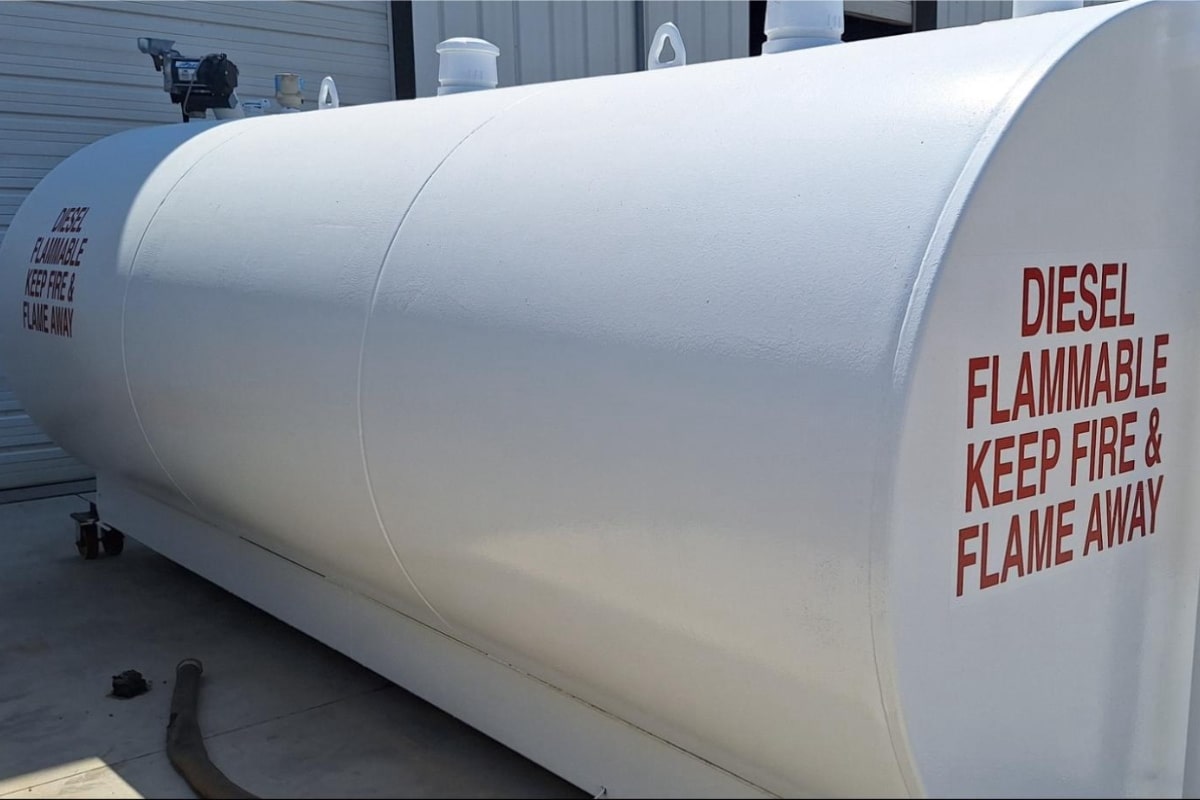Whether you need fuel for your fleet, construction company, or c-store, your fuel tank is the heart of your operations. But like any critical piece of equipment, it needs care. A fuel tank inspection isn’t just a box to check; it’s a proactive measure that can protect your business from downtime, regulatory fines, and costly cleanup from tank failures.
Keep reading to learn why fuel tank inspections are crucial to your business, what a proper inspection should include, and how often to have one done.
Why Are Fuel Tank Inspections So Important?
Fuel storage tanks — whether above or below ground — are constantly exposed to moisture, pressure fluctuations, and environmental stress. If left unchecked, this can lead to corrosion, leaks, or even structural failure. Regular fuel tank inspections can:
- Prevent Leaks and Spills: Corrosion, compromised seals, and other mechanical faults can release fuel into the ground, resulting in environmental hazards and costly cleanup costs.
- Protect Fuel Quality: Over time, water and sludge can accumulate in your tank, degrading fuel quality and potentially damaging engines and equipment.
- Avoid Costly Downtime: A failed tank can halt your operations and delay fuel delivery or usage, creating costly downtime.
- Ensure Regulatory Compliance: Owning a fuel storage tank means that you have to comply with federal, state, and local government regulations, like the Environmental Protection Agency’s (EPA) Spill Prevention, Control, and Countermeasure (SPCC) rules. Routine industry-standard inspections, such as those outlined by the American Petroleum Institute (API) or the Steel Tank Institute (STI), ensure that your tank complies with these regulations.
What Should Be Included in a Fuel Tank Inspection?
Hiring a professional who knows how to perform a fuel storage tank inspection according to your tank’s regulatory requirements is the best way to ensure compliance. Still, it’s beneficial to understand what goes into the different types of inspections.
Visual Inspection
Exterior assessments are the most frequent type of bulk storage inspections. A thorough walk-around can reveal early warning signs that something is wrong. Here are some items to frequently check for:
- Corrosion or Rust: Tank seams, joints, and bases are especially susceptible to rust or corrosion, which may weaken the tank’s integrity.
- Visible Damage: Look for bulges, dents, or any deformation that may signal recent damage or internal pressure issues.
- Leaks or Fuel Residue: Even minor seepage can indicate a faulty seal or other looming failure.
- Issues with Protective Coatings: Peeling or cracked paint may not seem significant, but it can compromise your tank’s defense against corrosion.
- Damaged Supports and Footings: Unstable foundations can compromise tank integrity over time. Check your tank’s platform for cracking, sinking, or erosion.
Internal Inspection and Testing
External inspections can reveal a great deal about the overall health of your tank, but professional internal inspections and technical testing can provide the concrete data necessary to make informed decisions about repairs, replacements, and upgrades. Investing in this level of detail can mean the difference between ongoing reliability and unexpected, expensive failure. Here are some of the tests qualified professionals perform:
- Ultrasonic Thickness Testing: This technique uses high-frequency sound waves to measure the thickness of your tank’s wall. It helps detect thinning caused by corrosion without needing to cut into the tank.
- Magnetic Particle Testing: In this type of testing, the tank is magnetized, and iron particles are applied. Flaws in the tank disrupt the magnetic field, causing particles to gather and highlighting problem areas.
- Magnetic Flux Leakage (MFL) Testing: MFL testing is similar to magnetic particle testing, but it’s primarily used on larger surfaces, such as the bottom of your tank. In this type of assessment, a magnetic field is applied to the tank shell, and specialized sensors detect defects caused by corrosion or material loss.
- Water and Sediment Checks: Over time, water and sediment can accumulate at the bottom of your fuel tank. This can lead to microbial contamination, clogged filters, and corrosion. Inspectors can use a variety of methods to assess contamination levels.
- Vent and Valve Testing: The last thing you want your fuel tank to do is build up dangerous levels of pressure or vacuum. Inspectors can confirm that emergency vents, standard vents, and pressure-relief valves are functioning correctly and free from blockages or corrosion.
Helpful resources:
How Often Do Fuel Tanks Need to Be Inspected?
The frequency of fuel tank inspections depends on the type of tank, its age, location, and whether it’s aboveground or underground. For example, shop-fabricated tanks may require less frequent inspections than field-erected ones, according to the EPA’s SPCC Guidance for Regional Inspectors. However, industry standards like those from API and STI do provide some general guidelines:
- Monthly Visual Inspections: According to the STI SP001 standard, tanks should be visually inspected monthly for signs of leaks, rust, dents, unusual wear, and other mechanical issues.
- Annual Professional Inspections: An inspector with the proper certifications (typically API 653 or STI SP001) for your tank type should conduct a more thorough storage tank inspection at least once a year. In addition to the areas covered during monthly inspections, professionals often check the tank’s valves, level alarms, insulation, structural foundation, and other components.
- 5-Year Integrity Tests: To meet STI or API standards, your tank may also need more advanced inspections every five years. These inspections often include specialized procedures, such as ultrasonic thickness measurements and magnetic particle testing.
Please note that inspection requirements vary by state, and your local authorities may require more frequent inspections.
Need Reliable Fuel Delivery? Venture Fuels Can Help
Maintaining a clean, safe system is only part of the equation. To keep your operation running smoothly, you also need a fuel supplier you can count on. Venture Fuels delivers high-quality bulk fuel on time, every time, to help you maximize the value of your storage investment. Contact us today to discover how our reliable wholesale fuel supply can support your business.


